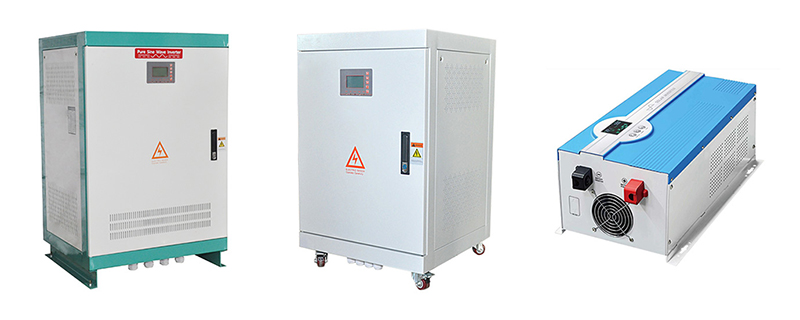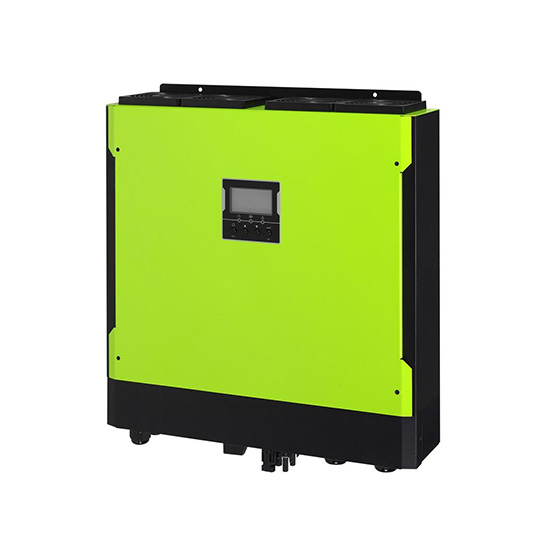In the world of solar energy, the inverter is often regarded as the "brain" of the system, converting solar radiation into useful energy. Different types of inverters, including on-grid, off-grid, and hybrid inverters, cater to various energy needs and system configurations. Choosing the right inverter is crucial and depends on your specific solar installation and energy consumption requirements. Today this blog posted on Inverter.com will explore the differences between hybrid solar inverters and off-grid inverters to help you make an informed decision.
What is an off-grid inverter?
Off-grid inverters are designed to operate independently of the utility grid. They are typically used in remote areas where grid power is unavailable or unreliable. Key features include:
- Independence from the Grid: Off-grid inverters do not synchronize with the grid. They connect to the property directly and provide power exclusively from solar panels and battery storage.
- Instant DC to AC Conversion: These inverters convert direct current (DC) from the batteries, which are charged by the solar panels, into alternating current (AC) to power household appliances.
- Reliability during Grid Failures: Because they do not rely on the grid, off-grid inverters can continue to supply power even during grid outages.
- Cost-Effectiveness: Off-grid inverters are often less expensive than hybrid inverters due to their simpler design and functionality.
However, the main drawback of off-grid inverters is their inability to draw power from the utility grid. This can lead to power shortages if the solar panels and batteries are insufficient to meet demand, particularly during periods of low solar exposure.
What is a hybrid solar inverter?
Hybrid solar inverters, also known as multimode inverters, combine the functionalities of solar and battery inverters. This versatility offers several benefits:
- Integrated Power Management: Hybrid inverters manage power from solar panels, batteries, and the grid, optimizing energy use and storage.
- Flexibility and Efficiency: These inverters can draw power from the solar panels, the grid, or the battery storage as needed, ensuring a continuous power supply.
- Grid Interaction: Hybrid inverters can feed excess solar power back into the grid, potentially earning credits or reducing electricity bills.
- Battery Backup: In case of a grid failure, hybrid inverters can switch to battery power, providing uninterrupted electricity.

The main advantage of hybrid solar inverters is that when the solar energy generated is not enough to run the load, the excess power can be drawn from the grid. In addition to this, the batteries provide backup power in case of grid failure. Thus, hybrid inverters provide a constant power supply and you do not have to worry about power outages.
Differences between a hybrid inverter and an off-grid inverter
- Grid Connectivity: The primary distinction is that hybrid inverters can connect to and interact with the utility grid, while off-grid inverters operate independently.
- Energy Storage: Hybrid inverters have built-in battery connections that store energy for later use, whereas off-grid inverters rely solely on battery storage without any grid input.
- Backup Power: Hybrid inverters provide backup power from the grid when solar energy and battery storage are insufficient. Off-grid inverters depend entirely on the batteries charged by solar panels.
- System Integration: Hybrid systems can export excess solar energy to the grid once the batteries are fully charged. Off-grid systems, however, can only store excess energy in the batteries, and once full, the solar panels must stop generating power.
Differences in the operation of hybrid and off-grid systems
Hybrid Systems: These systems integrate solar power, battery storage, and grid connectivity into one cohesive unit. They offer flexibility by storing excess solar energy in batteries and exporting surplus energy to the grid. When battery power is low, the grid can provide backup electricity, ensuring a constant power supply.
Off-Grid Systems: These systems are entirely self-sufficient, relying on solar panels and battery storage without any grid connection. Excess power generated by the solar panels is stored in the battery pack, and once fully charged, the system stops generating power to avoid overcharging the batteries.
Intelligent scheduling strategy
Formulating personalized power consumption plans based on the differences in power demand in different areas of the building is essential. During peak hours during the day, solar panels, photovoltaic power, and energy storage batteries are used for power supply; during low-peak hours at night, energy storage batteries are charged during the preferential power price period of the grid.
Choosing the right inverter
Choosing between a hybrid solar inverter and an off-grid inverter depends on your specific needs and circumstances. Hybrid inverters offer greater flexibility, efficiency, and reliability by integrating solar, battery, and grid power. They are ideal for areas with frequent power outages and for users looking to maximize their solar investment through grid interaction. Off-grid inverters, while more cost-effective, are best suited for remote locations where grid power is unavailable or for users seeking complete energy independence. Inverter.com believes that knowing these differences will help you select the right inverter to meet your energy requirements and ensure a stable and reliable power supply.
In conclusion, both hybrid solar inverters and off-grid inverters play crucial roles in the effective utilization of solar energy. By assessing your specific energy needs, location, and budget, you can make an informed decision that maximizes the benefits of your solar power system.

"In this system, once the batteries are fully charged, the excess solar energy can be exported to the grid."